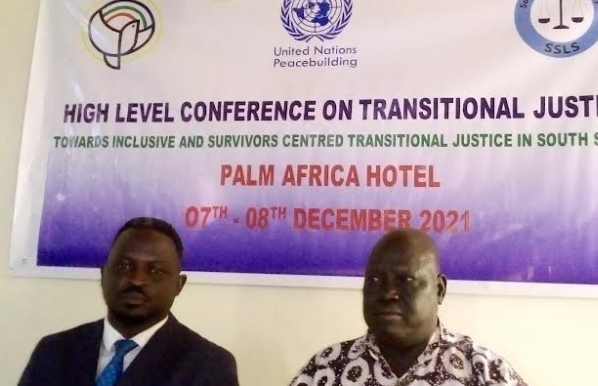Civil society organizations and government should conduct civic education and awareness to create a safe environment for public consultations and agreement on the implementation of transitional justice institutions in South Sudan, stakeholders said.
The call emerged at the end of a high-level stakeholder’s conference organized by the South Sudan Law Society (SSLS) in Juba on Wednesday.
In his opening remarks at the opening of the conference, the interim chairperson of the peace monitoring body (R-JMEC), Maj. General Charles Tai Gituai acknowledged the Council of Ministers’ resolution endorsing a roadmap for the implementation of Chapter V of the revitalized peace agreement.
“This convening provides a great opportunity for the leaders in the room to fashion strategies that enable survivors to be at the core of transitional justice efforts. By doing so, we will develop a context-specific transitional justice program for South Sudan where the common objectives of Chapter V; truth, reconciliation, healing, compensation, and reparation are supported,” Gen. Gituai said.
Chapter V of South Sudan’s revitalized peace agreement deals with transitional justice and the establishment of mechanisms to promote accountability, truth, reconciliation, and healing in South Sudan.
Gen. Gituai said the peace monitoring body will remain focused on its monitoring and oversight mandate, keeping a close eye on survivors’ participation and engagement in South Sudan’s transitional justice processes.
The South Sudan Law Society board chair, John Clement Kuc, said the transitional justice mechanisms will address human rights violation issues in the country.
“The Transitional Government of National Unity must show the political will towards the establishment of the transitional justice mechanisms,” he stressed.
Beny Gideon Mabor, a Commissioner at South Sudan Human Rights Commission (SSHRC) emphasized the need for an independent Commission for Truth, Reconciliation, and Healing (CTRH).
“The independence of a commission is defined by its ability to apply its legal mandate free of actual or apparent pressure, unwarranted influence or dependence on any other person whether a legal or natural person,” Mabor said.
He called for a transparent and competitive selection and appointment of commissioners through a consultative process, with input from different sectors of society, victims, and other marginalized groups.
The Law Society’s program coordinator, Farouk Ismail Ukach, commended the ongoing mutual cooperation between the civil society, government, and partners in the implementation of the peace deal.
He urged the government to ensure holistic and gender-sensitive legislation on transitional justice institutions that ensure the protection of victims, witnesses, and survivors in the course of transitional justice exercise.
“We call on the government to enact legislation that recognizes victims, witnesses, and survivors in the center stage of the transitional justice processes and the said laws should ensure a consultative and transparent selection and appointment of commissioners and other relevant staff,” stressed Ukach.
The various stakeholders further recommended that all consultations on transitional justice be geared towards promoting unity in diversity, stressing that implementation of Chapter V must be inclusive and reflective of our diverse views and experiences to foster forgiveness, harmony, and national healing.
The United Nations Peacebuilding Fund supported the event on the theme, “Towards Inclusive and Survivors’ Centered Transitional Justice in South Sudan”.




